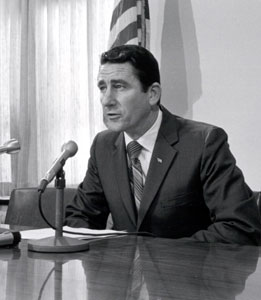
Winfield C. Dunn
In November 1970 Winfield Dunn defeated Democratic Party nominee John J. Hooker and became the first Republican to be elected governor of Tennessee in a half-century. Before his election to the governorship, Dunn had never held public office and was a virtual unknown, except to a handful of Republican activists. His election was a visible sign of the growing strength and popularity of the Tennessee Republican Party in the 1960s.
Winfield Dunn was born on July 1, 1927, in Meridian, Mississippi, to Aubert C. and Dorothy Crum Dunn. Despite his lack of political experience, Dunn was raised in a political environment; his father represented Mississippi in the U.S. House of Representatives, 1935-37. Dunn graduated from the University of Mississippi in 1950 with a degree in business administration; he minored in political science. In the early 1950s he married Betty Jane Prichard of Memphis while attending dental school at the University of Tennessee, Memphis. He later practiced dentistry in Memphis.
Republican politics attracted Dunn even as a college student. In 1952 he was a spokesman for the Eisenhower ticket. After settling in Memphis, Dunn failed in a bid for the state's general assembly in 1962. In 1964 he worked with the Tennessee Republican Party on behalf of Senator Barry Goldwater's presidential campaign. Dunn was a delegate to the 1968 Republican National Convention, where he supported the presidential nomination of Richard M. Nixon. His victory in the 1970 governor's race assured Dunn's prominence in the new generation of southern Republicans. In 1973 Dunn was elected vice-chairman of the Republican Governors Association and in 1974 was elevated to the chairmanship of that body. Dunn was not eligible for reelection in 1974 and was succeeded in the governor's office by Democrat Ray Blanton.
As governor, Dunn developed a statewide kindergarten program, pushed highway construction legislation to an all-time high, reorganized major branches of the state government, and created the Department of Economic and Community Development. In the reorganization of state government, Dunn created the Department of General Services to coordinate and administer state purchases and manage state properties. In 1972 the Department of Personnel was divided to enhance efficiency in the recruitment, examination, and training of state employees. A key theme of Dunn's administration was the lessening of the historic tensions and rivalries between the state's three “Grand Divisions.” To this end, Dunn brought into government service both Republicans and Democrats from all parts of the state. His executive order to change billboards greeting motorists at the state line from the familiar “Welcome to the Three States of Tennessee” to “Welcome to the Great State of Tennessee” also demonstrated his desire for unity.
After leaving the governor's office, Dunn served as chairman of both the University of Tennessee Board of Trustees and the Tennessee State Board of Regents. Dunn remained active in both state and national Republican Party politics, serving as chairman of George Bush's Tennessee Steering Committee in 1988. In 1986 he lost a close gubernatorial campaign to Democrat Ned Ray McWherter.
Since 1974 Dunn has also been active in many charitable organizations, including the Nashville Heart Association, the Nashville Conference of Christians and Jews, and the Nashville Chapter of the American Cancer Society. He served on the Executive Committee of the United Way. He was chosen Tennessee's Man of the Year three times by news and business organizations throughout the state. In the 1990s Dunn returned to the medical field. He served as chairman of Medshares, a healthcare company based in Memphis, and he also served on the boards of Phycor, Incorporated, and Behavioral Healthcare Corporation.
Suggested Reading
William R. Majors, Change and Continuity: Tennessee Politics Since the Civil War (1986)



